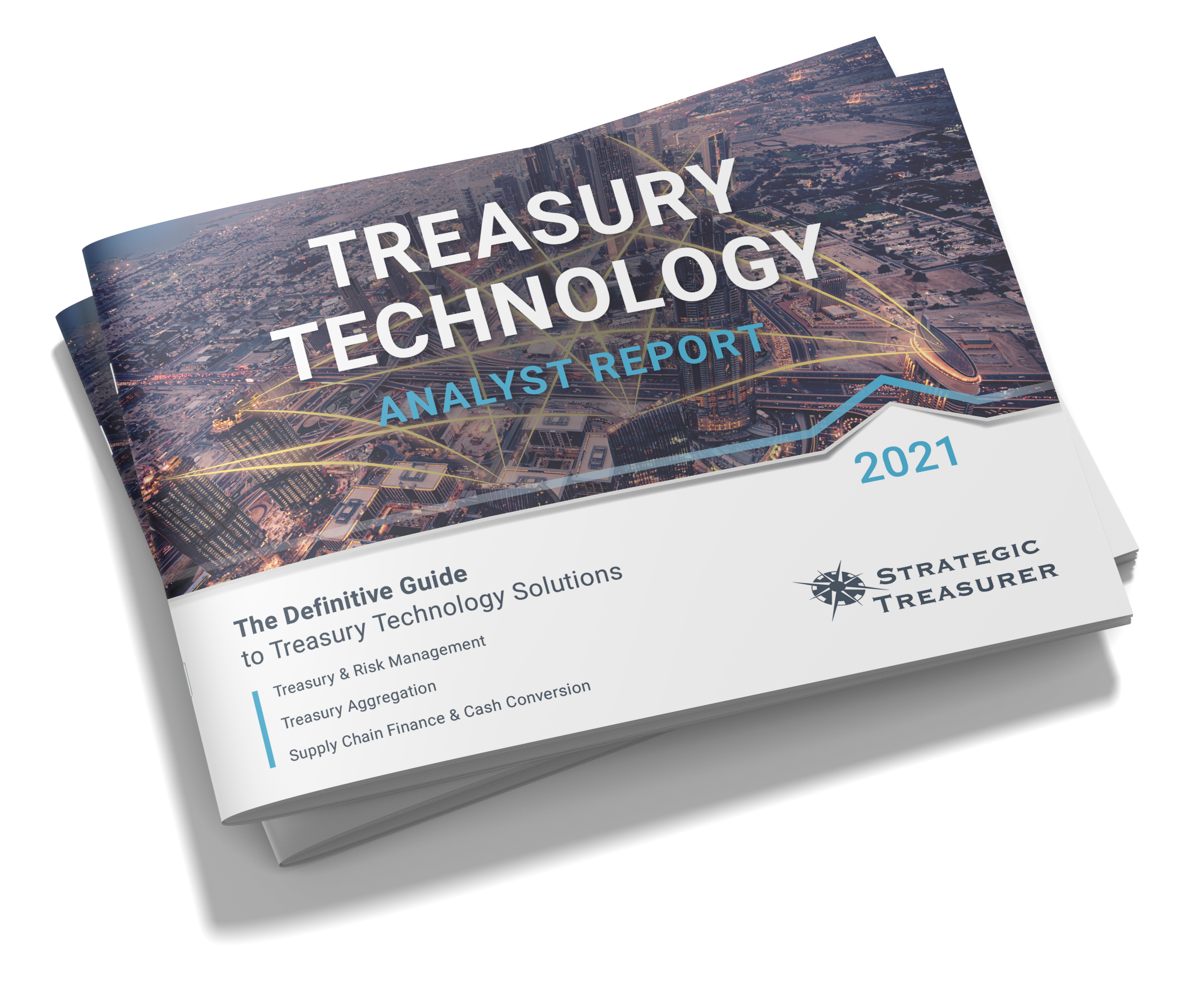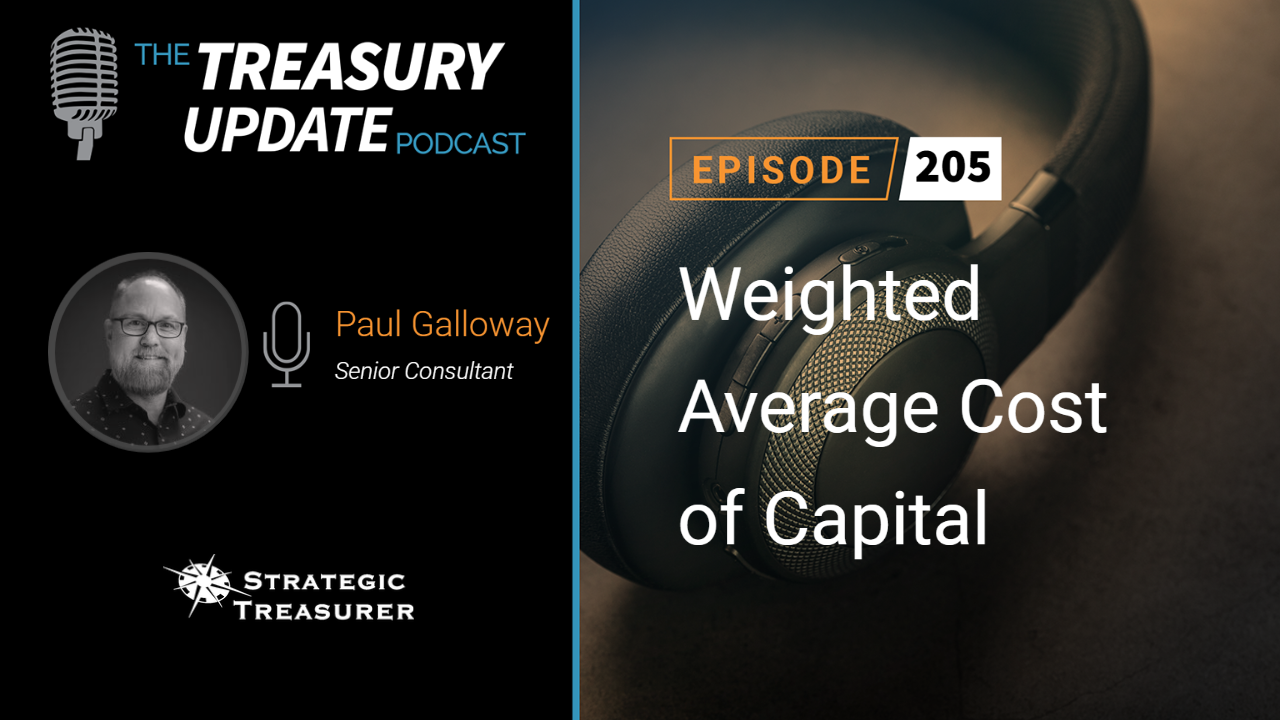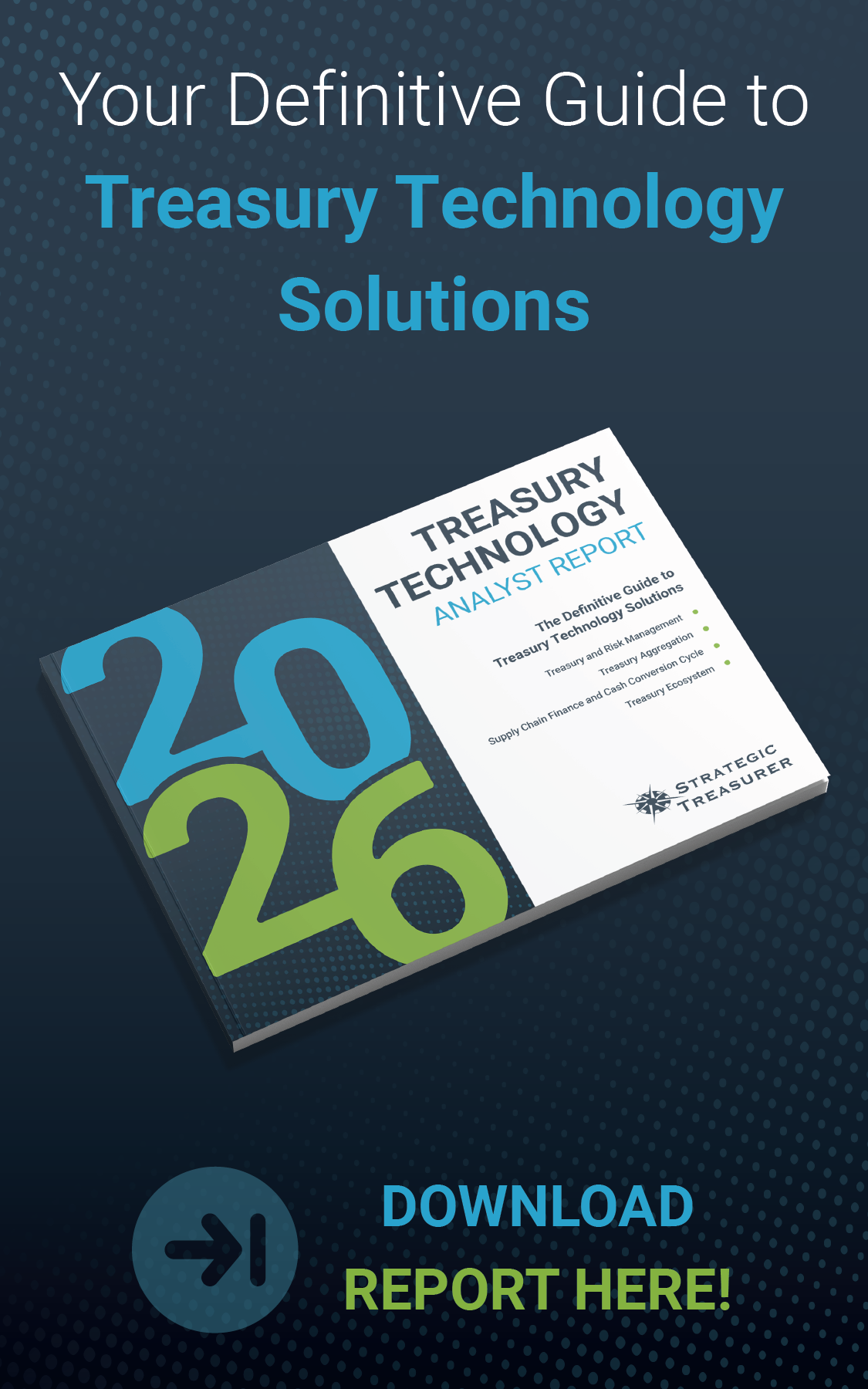
Episode 221
Interest Rates, Liquidity Plans, and the Midterm’s Effect on Treasury
Host:
Jason Campbell, Strategic Treasurer


Speaker:
Craig Jeffery, Strategic Treasurer


Speaker:
Paul Galloway, Strategic Treasurer


Subscribe to the Treasury Update Podcast on your favorite app!
Episode Transcription - Episode #221 - Interest Rates, Liquidity Plans, and the Midterm’s Effect on Treasury
Announcer 00:04
Welcome to the Treasury Update Podcast presented by Strategic Treasurer, your source for interesting treasury news, analysis, and insights in your car, at the gym, or wherever you decide to tune in.
Jason Campbell 00:19
Thank you for tuning in to this episode of the Treasury Update Podcast. My name is Jason Campbell, business development leader here at Strategic Treasurer. And I’m thrilled to be hosting today’s discussion around mid term effects on treasury interest rates and liquidity planning. My guests today are Craig Jeffery, managing partner and Paul Galloway. Gentlemen, welcome to the show.
Craig Jeffery 00:38
It’s good to be here.
Paul Galloway 00:39
Yeah, thanks, Jason.
Jason Campbell 00:40
You know, it’s that time of year, the ads have already begun. I don’t know if you guys have seen it or not, I’m sure you have. Right, because they’re everywhere. So it’s that time of year when you think about midterm elections that are coming up. And it’s funny, I was actually, with my son, we were we were looking through an educational program in his on YouTube. And it really was a children’s program. And then boop pops up is a political ad. So it’s it’s all over the place. So with midterm elections just weeks away, let’s take a trip down memory lane and chat about some past effects on treasury as a result of midterms. So if you gentlemen, Craig, I’ll start off with you here. If you want to give us some thoughts around, you know, impacts of what midterms can be or have been to treasury,
Craig Jeffery 01:24
You know, as I think back on midterm elections, they tend, they tend not to have too big of an impact on different activities. Certainly on fiscal activities, there’s always a bit of a trying to get the electorate juiced up about something that’s been the case generally, it’s fairly muted. There’s there’s a bigger impact on Treasury much more concern, and decision points before, like presidential election. So since midterms tend to be more muted, I guess I would say, Now, this one, there’s a few other things that are having an impact on Treasury in a midterm. So it’s a little different than some of the other ones. I would say at least that’s that’s how I’m remembering midterms less impactful than the presidential election years. And, Paul,
Paul Galloway 02:11
Yeah, I would tend to agree with that where there could be some impact coming from midterms would be, you know, a change in the House or Senate, where it could impact or influence policymaking that could have a downstream effect to organizations. But generally, midterms aren’t is as big a impact as a presidential election is Craig pointed out,
Craig Jeffery 02:36
I said something about this this midterm. There’s a few other things that I think are coming concurrently with midterms in the US. And you see other things happening globally. So I think there’s a couple things there that are, you know, what’s happened in the past what’s happening now, you know, the midterms, it’s not just the midterms that concern treasury, there’s inflation. There’s the recession that we’re in, in the US, there’s high high inflation in the UK, concerns about global recession, you know, 98%, but it’s not just about us midterms, you know, just looking across the across the pond, a significant economy country, the UK, there’s been a lot of leadership change, I mean, the queen, the Queen’s passing a new king, we’ve also had the Prime Minister Liz Trust has now been in place since September 6. Taking over from Boris Johnson, she’s the new head leader, the Conservative Party has made significant changes in their taxing process, which had a, you know, roll on effect, impact on the, you know, weakened, at least weakened significantly the pound for a time. And that coincides with less aggressive interest rate increases by the Bank of England compared to the Fed. So there’s a number of things happening there. And that’s just one aspect on the US midterm side. If we look at that, as you know, you know, midterms is just another element that impacts treasury, politicians, really, they control some fiscal policy, the Fed controls monetary policy, you know, theoretically very independent on the monetary policy. So, fiscal policy, there’s certainly been a number of things done, which I think we get a tribute to, you know, as a lead up to the midterm elections to help reduce some of the price and inflation that we’ve, we’ve seen taking taking place.
Jason Campbell 04:26
In our country, right, our narrow focus is on what’s going on within our borders, right, knowing that our midterm elections, but what you probably could point, though, is the global aspect of it, right? So the UK, what’s going on? In that situation? If I’m not mistaken, there was Italy, who just again, a different swing of government that was just elected, and just how the global impacts right so not just the US market, but how’s the impact from a global scale and different currencies and different stocks, different organizations? You know, even when we think about, you know, how it impacts our supply chains. There’s so many different variables out there that outside of just the our US or US policies and our lawmakers that we don’t probably put into consideration all the time, Paul, your thoughts?
Paul Galloway 05:09
Kind of dovetailing on the comments that Craig made, especially from a global standpoint, I can’t not bring up Russia, Ukraine today, President Vladimir Putin annex the eastern portion of Ukraine, that is going to have significant impacts globally, it’s already impacted Europe significantly from a gas and oil supply standpoint, is putting pressure on the UK, they put pressure on food supplies with this for and now, you know, they’re putting a stake in the ground. And most people view that as an illegal stake in the ground, which I would agree with it. So things are heating up there. And then we can look at, you know, what’s going on with China and Taiwan, and the muscle play that’s going on, or recently went on with what China was doing there. So, you know, we’re seeing some, some global pains, just from a conflict standpoint, you start adding on the economic side of things that can bring some issues to treasury writ large.
Jason Campbell 06:26
So bringing it back into that column here in the US, last week, the Fed raised interest rates by another 75 basis points to help combat inflation. With the change in interest rates, this must also call for different plans of action, correct?
Paul Galloway 06:41
Rising interest rates, we’re going to see more rate hikes this year in into next year. The reason that we’re seeing that is the high inflation, you know, we’re still sitting at about a percent, the Fed wants something that’s closer to a 2% level and a longer term basis. And the only way you get there is you go cool down your economy, our economy is still really red hot, we have very low unemployment, we have high inflation. People are, you know, organizations continue to make investments in their in their companies, it’s, you got to cool it down, a good way to do that is raise interest rates. So from a treasury perspective, you start looking at, well, how’s my balance sheet Look, today, maybe I need to raise capital now versus waiting until next year to raise it because rates are going up. So you see some organizations trying to take advantage of the lower rates now relative to what they’re going to be in the future. And a lot of that is probably already happened, but there’s still some that’s gonna go on. Eventually, what you’re going to see is that organizations are going to start drawing back, we’re starting to see signs of that. In terms of employment. So meta just announced that, you know, they’re going to pry pull some jobs and let some people go. Other organizations have been doing that I think the first step will be new job openings won’t happen. The next step will be that we’ll probably see organizations let certain folks go. They hope through no new jobs and attrition and not rehiring that to be able to manage some of that. But we’ll see that unemployment rates are gonna go up, interest rates are gonna go up, it’s gonna cost more to fund things. The flip side is if you’re a bond investor higher yields mean, you get better yield on your cash return. So we’ve had a long period of low cash returns, and we’re gonna see cash returns are rising, they’re gonna continue to rise. So from a cash return perspective, cash becomes a little bit more important than it used to be from a return profile.
Craig Jeffery 09:04
Yeah, just following on what Paul said, you know, this increase in interest rates has a number of repercussions. Why are interest rates rising? Well, from the Fed perspective, they’re trying to get caught up with what’s going on with inflation. So this catch up game of rising Matt to tamp down inflation, and they’re behind, and yet they’re being more aggressive than some of the other central banks. And so that creates a couple other impacts as well. Paul mentioned some things related to borrowing or your investment portfolio if you have one of those. But there’s also this knock on effect for rate differentials, you know, in terms of what the the foreign currency pairs are doing, and that’s why we’ve seen the weakening of the pound. We’ve seen the weakening of the euro, a number of currencies against the US dollar due to the rapid escalation of the interest rates here and so the arbitrage of rates is causing money to flow in that direction. how that has an impact on trade to because US dollar or you’re selling US dollars, that’s more expensive now, compared to your your home currency. So there’s a number of those factors that, that play into that. I think those are things that, you know, it’s not just midterm related, of course, but that’s really what’s what’s going on in the economy, and how our central banks are trying to, you know, you know, thread the needle between, you know, inflation, stagflation, recession, etc. And so we’ve got, we’re in a recession, we’ve got inflation going up, concerns about dropping into stagflation or a more serious recession. So those are those are all the elements that say, Treasury’s Treasury needs to earn their keep in looking at the potential scenarios and what’s appropriate to do.
Jason Campbell 10:45
So you said it a couple of times, it’s a great segue into our next topic, that our word that we keep hearing, that’s all over news outlets, you know, or even just in general, in the business world, that recession. So we’re hearing that word recession an awful lot these days, you know, and it’s, I’m sure, it’s top of mind for many companies, especially as they work their blueprint for 2023. So let’s talk about cash for a moment. How much cash do you keep as an organization? If you’re worried about a an economic hiccup on its way?
Craig Jeffery 11:16
You know, I think I think that’s a good question. But I think we can probably do a little bit more exploring on some midterm activities and some of the things that lead to that, because I think there’s a few more elements that that follow on. So let me let me just jump into one of those. So if we go back to November of 2021, President Biden released in order to a release of like, an extra 50 million barrels of crude from the SPR the strategic petroleum reserves. And then I think it was the very end of the first quarter, he set aside an order to release a million barrels daily until 180 million barrels were pumped into the general market, this is the rise of prices. At the at the pumps, there was a lot of significant concerns there on the price. And so what we’ve seen is, you know, we’re probably at the point where 100 80 million barrels has been released, or we’re about at that point. I don’t know, I did some looking to try to find out how much has been released? I don’t think there’s a there’s a, you know, daily reporting of it. But that’s, that’s significant. That’s, you know, we’ve seen a drop in the SPR have over 25% in less than a year. And we’ve never done that. I mean, there’s certainly political reasons for releasing oil. There’s practical reasons, political reasons, time to time when there’s pricing issues that’ll be released, that’s been done over lots of administrations. But this is this is really, really significant in terms of the size and speed of what’s going on. And so, I guess, part of that is, what does that what does that do? Is that, is that geared to just provide price relief pressure? I don’t think that that certainly candles that in the short term, because the market has more fuel. But does that make a long term impact? So I guess, you know, when we think about this is, you know, there’s a storm, there’s a shortfall in supplies, you know, we need energy, great use for there’s a war, there’s uneven distribution, distributing the energy works. If there’s a situation where there’s, you know, you’re in the winter, and people are in danger of freezing, that’s a perfect reason to release it, prices are moving higher energy costs are more seems like that’s not as good of a reason to do. So. If it’s a temporary situation, you know, maybe a provide some relief, but more of a long term issue, that seems to be a bit of a challenge. There can be lots of different views on that. But certainly, this is a massive release of oil systematically over a period of time. And this has also been done one, you know, the use of fuel has been has been declining. So, you know, that’s in the context of what’s going on with interest rates, inflation, and a general recession. So I think those are, those are sort of the backdrop of what Treasury needs to do. Paul, I don’t know if you had any, any other thoughts on that? Either. But to me, that’s a that’s a bit context. Because, you know, the supply and demand and supply, find an equilibrium and when we artificially use, you know, the SPR to address this, that’s that’s a different type of movement. It’s a rainy day fund used for something that may be systematic or systemic.
Paul Galloway 14:33
Yeah, correct. Yeah, I think those are great comments, and from a treasury perspective, and you think about you know, we’ve had such an extended period of easy money, you know, low interest rates, easy access to cash, and capital and organizations, I think, you know, they drink a lot of the Kool Aid for lack of better term St. So, they’ve packed on a lot under the balance sheet, probably leap perhaps more than they should for various activities. And when you see interest rates increasing, and you see the, you know, the Fed and trying to slow things down, making things more costly to raise capital, lots of economic turmoil, we are in a recession with whether it’s official or not, I believe we’re in a recession, I think we have a more global macro recession that’s in play, we have a lot of things that are going to be strong headwinds. And so from a treasury perspective, they really need to take a hard look at their operations, their balance sheet, what the impacts are going to be to the organization with a recession that’s in play in is things are gonna get tougher. And so they need make decisions now around, hey, do I try to get position so that if these risks come into play to where I don’t have access to capital or cash to keep the business funded and moving forward? You know, it’s that can be a huge problem. So, you know, organizations are looking at contingent capital, or getting facilities in place that will allow them access to capital, if something were to come up. So I think, from a treasury planning perspective, organizations are looking to their treasures and their treasury teams to provide analysis information and tools to make decisions around the balance sheet and position it for the next 12 to 24 months, because I think it’s gonna be it’s going to be tough for organizations in any industry, I think things that are going to get tougher, and treasury’s going to be relied upon leaned upon for these moments, we’re definitely facing.
Craig Jeffery 17:07
We are in a recession, the US? No, they just confirmed the second quarter was a slight decline. I think that the the more important piece is what does it look going forward? Are we going to go into something that’s much more moderate or serious recession, it’s fairly minimal, like we’re just we’re just dipped into that territory. And so the forward look is more important than are we in or not, I know that that may make a lot of traction in midterms to to bring those up or not to push it or to deny it. That’s where we are. But going forward, there’s certainly a lot of luck. And I think I think I misstated the number before, I think it was 96% of economist thought there’d be a global recession in 2023. And I think that’s worth noting, because that’s, you know, static or stasis is easier to manage than change. And if we’re dipping down, that’s a different set of skills that’s necessary. And you you talked about a number of those, I think it’s the it’s the rate of change, and how many changes are impacting us that matters. And I know that gets back to your your question, Jason, about how much cash to keep, if you’re worried about a coming economic hiccup? I know Paul started on that, you know, as well, but, you know, you know, where do you keep it, you know, this idea of diversification of sources, you know, renewing your your terms early, going out longer, you know, as people prepared for that they’ve done well, things are getting a little more costly. Paul had a number of good points on that. I won’t repeat, I won’t repeat those. But this idea, the more concerned you are about volatility, the more margin or reserves you have on one hand, the more you want to have a comfort level, right? It’s, the more things are fluctuating the more margin, a comfort you want to have on that just to be able to adapt. And that’s the that’s the role of the treasurer. And so they have ability to have more on hand, there’s more levers they can use. And so this is these are really good times for Treasury to practice their discipline, use the different levels know what they are, and figure how, figure what they can do to make sure that they ensure the company’s liquidity is adequate.
Jason Campbell 19:16
And I’m sure right now to also it’s not like it’s it’s a shock factor that I think the word recession, I think economists have been predicting this for quite some time. And hopefully, that you know, putting a playbook together for you know, as an organization and saying, Hey, if this does happen, what what is our what’s our plants? And how are we going to respond to react to sustain our business model through a rough time, right through the rough seas, as you will. So hopefully, there’s been some some some preparation as you will into this.
Craig Jeffery 19:43
Yeah. And it’s, you know, so the, the idea of, of history, like we’ve been in recessions, different times, depends on how old you are. Yeah, I mean, maybe you can remember back to 87. You can remember 2008 2009 a significant disruption in the markets, freezing up at the desk. Capital Markets. So what we’re in now is not not particularly troubling compared to what we’ve seen in the past. But again, it’s always how do we look forward? How are we careful. And this says a lot about not only how we plan on the balance sheet, but how we help our organizations become more efficient in all our processes, you know, reduce, reduce our risk, or D risk the organization. So we don’t suffer the big issues and layering on financial instruments where appropriate to avoid the more catastrophic, financially catastrophic types of activity. So, yeah, all those all those fit well into, hey, there’s a few more headwinds, humor crosscurrents. This is the time to, you know, hone your skills even more for sailing.
Jason Campbell 20:48
Absolutely. But Craig, Paul, always great to hear your perspective and insight on topics impacting treasury and for our listeners, thank you for joining us today for another episode of the Treasury Update Podcast. With that being said, stay safe, and we’ll see you next time. Take care.
Announcer 21:01
You’ve reached the end of another episode of the Treasury Update Podcast. Be sure to follow Strategic Treasurer on LinkedIn. Just search for Strategic Treasurer. This podcast is provided for informational purposes only, and statements made by Strategic Treasure LLC on this podcast are not intended as legal business consulting or tax advice. For more information, visit and bookmark StrategicTreasurer.com.
Related Resources
Researching new treasury and finance technology can be overwhelming. Strategic Treasurer has stepped in to help. Explore our definitive guide to the treasury technology landscape and discover detailed, data-based coverage of each area.
Weighted Average Cost of Capital
A firm’s debt and equity are important components when investors are watching. What is the cost to fund your operations? What costs are required to make investments or develop new products? In this podcast, Craig Jeffery and Paul Galloway of Strategic Treasurer discuss your WACC or Weighted Average Cost of Capital.








